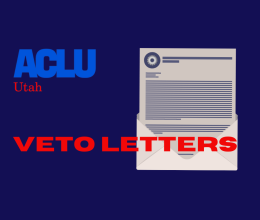
2024 Veto Letters
2024 Veto Letters
H.B. 257
Sex-Based Designations for Privacy, Anti-Bullying, and Women’s Opportunities
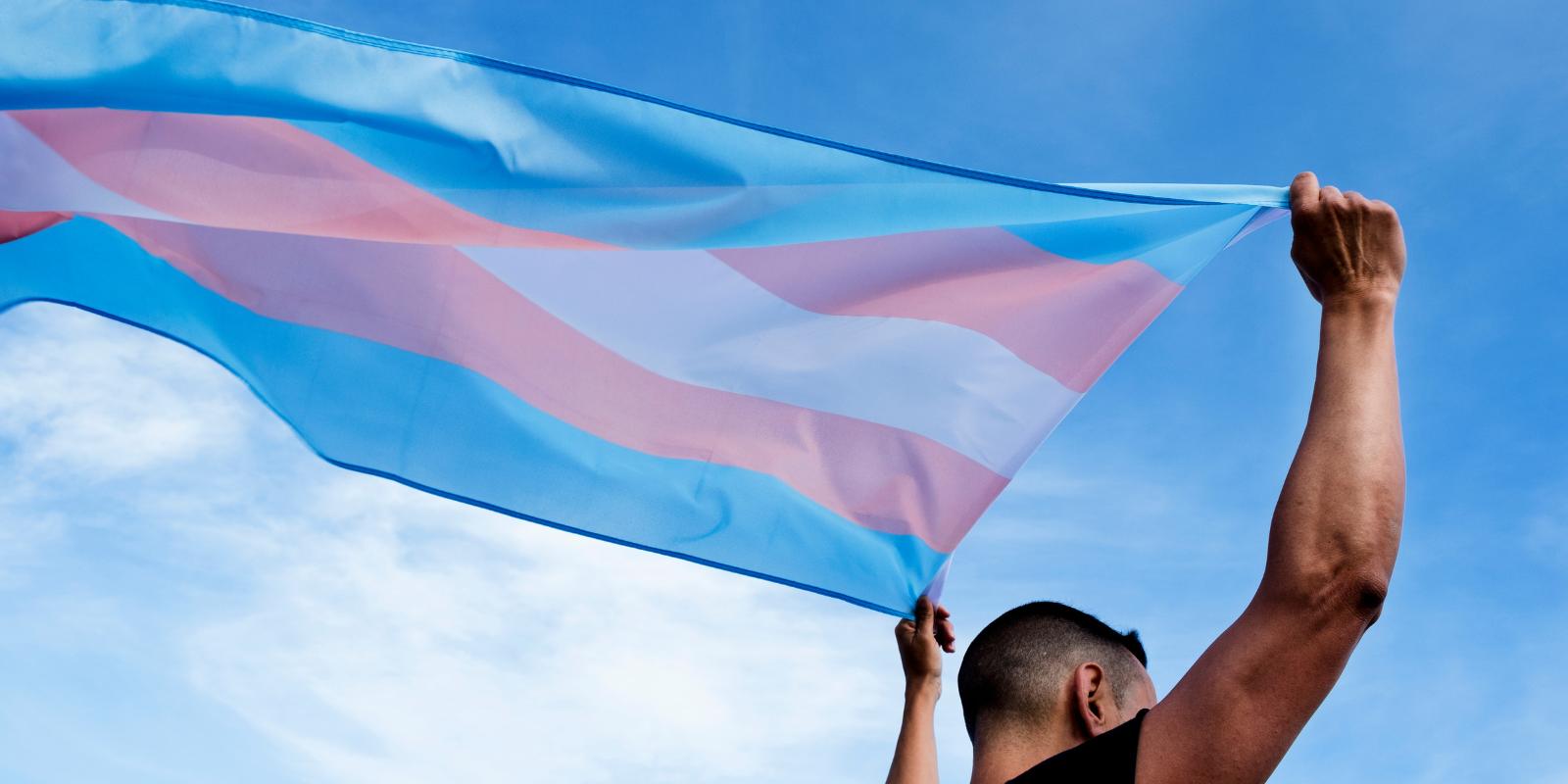
Dear Governor Spencer Cox:
The American Civil Liberties Union of Utah (ACLU of Utah) strongly urges you to veto House Bill 257, misleadingly titled "Sex-Based Designations for Privacy, Anti-Bullying, and Women’s Opportunities.” This bill perpetuates discrimination, needlessly imposes barriers to the everyday needs of people in Utah, and risks harmful and discriminatory enforcement against transgender, non-binary, and gender non-conforming people. Because this legislation will have severe consequences for the rights and well-being of all Utahns, but especially of Transgender and Nonbinary Utahns, we urge you to consider the core principles of liberty and individual rights our state claims to hold dear and veto this bill.
Transgender and Nonbinary Utahns are part of our communities, enrich our state, and deserve the freedom to live as themselves without facing discrimination. This bill seeks to codify outdated and inaccurate definitions of sex and families and, in so doing, severely limits – rather than expands - opportunities. By imposing unduly restrictive rules on accessing facilities and programs based on a person’s sex designated at birth, the bill disrupts the ability of individuals and communities to live their lives as valued members of society fully and publicly.
This bill is not necessary. Current Utah law already provides criminal penalties for harassment and assault in restrooms and public spaces. HB 257 does not provide additional protection for women in these spaces. All it does is invite scrutiny of people who are transgender or perceived to be transgender when they are lawfully going about their lives.
For students in schools, HB 257 could be used to single out transgender students for isolating and discriminatory treatment. Students who may have been using the same restrooms as their peers for years could be forced into separate, stigmatizing restrooms. School districts have been successfully helping transgender students safely transition at school, and now the legislature is attempting to remove the discretion of educators who are best positioned to ensure safe, inclusive school environments.
Every Utahn deserves to pursue their own happiness, and living authentically is critical to that freedom. People in Utah should not be forced to live with fear when using facilities that match who they are. Attending to one’s bodily needs lawfully and appropriately should never cause anyone to be subject to discrimination, surveillance, or arrest. This is particularly true for students in Utah, who should be allowed to focus on learning and gaining social skills at school, not whether they can devise a plan to use the restroom there.
HB 257 contains many provisions that, at a minimum, raise serious constitutional concerns. Under the United States and Utah Constitutions, laws are required to treat everyone fairly and equally. HB 257 falls well short of that promise.
The ACLU of Utah staunchly opposes HB 257 and others that attack the rights of LGTBQ+ people in Utah.
Thank you for your attention to this matter. We trust that you will carefully consider the potential consequences HB 257 poses to Utahns’ civil rights and individual freedoms and hope you will veto this unnecessary and harmful bill.
Sincerely,
Brittney Nystrom
Executive Director, ACLU of Utah
S.B. 57
Utah Constitutional Sovereignty Act
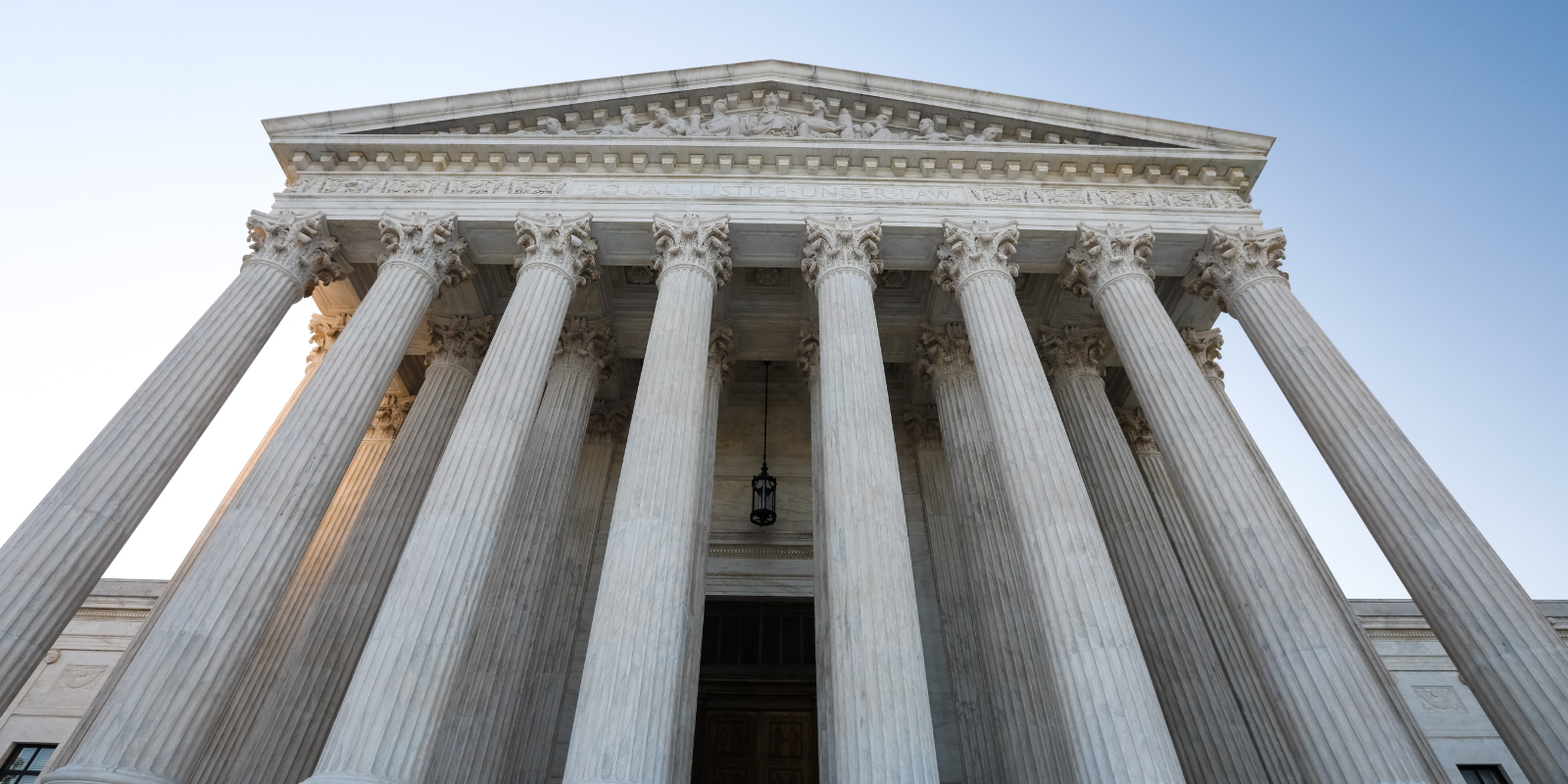
Dear Governor Cox,
The American Civil Liberties Union of Utah (ACLU of Utah) is writing to express our strong concerns regarding Senate Bill 57, also known as the Utah Constitutional Sovereignty Act. This bill purports to grant Utah the power to prohibit state government officials from enforcing or assisting in enforcing “federal directives,” including federal statutes.
We urge you to veto this bill as because it violates Article VI of the U.S. Constitution, the Supremacy Clause. Generally speaking, the Supremacy Clause establishes that the federal constitution and federal law govern over conflicting state laws or state constitutions. One reason that the Supremacy Clause is so vital is that it guarantees that everyone will enjoy all of the protections of civil rights and individual liberties provided by the U.S. Constitution and federal law, no matter which state they reside in. Purporting to give the Utah legislature the power to unilaterally declare that no Utah official will enforce or assist in the enforcement of a federal directive comes into clear conflict with this goal. For example, under this law, Utah could decide that it is refusing to allow any of its officials to enforce the federal Americans with Disabilities Act or the federal Civil Rights Act, leaving the people who benefit from those landmark laws less protected while that action is litigated. People in Utah deserve certainty that the state will honor their federal rights and protections, and SB 57 will throw this principle into serious doubt.
For all these reasons, we ask that you veto SB 57. Thank you for your attention and time in considering this request.
Sincerely,
Brittney Nystrom
Executive Director, ACLU of Utah
H.B. 29
Sensitive Materials Review Amendment

Dear Governor Cox,
Let Utah Read, a coalition of Utahns, educators, parents, librarians, and devoted guardians to preserving Utahns’ freedom to read, urgently contacts you regarding House Bill 29, Sensitive Materials Review Amendments. We implore you to wield your veto power against this bill, as it is a looming threat to the vibrant tapestry of ideas that should adorn our educational landscape.
HB 29, if enacted, would encourage individuals to stifle the voices of diverse authors and perspectives, casting a chilling shadow over the sanctity of our First Amendment rights. Imagine a world where schools and libraries were purged and shelves once brimming with Nobel Prize-winning authors like Toni Morrison, Judy Blume, and Sherman Alexie were left empty, depriving future generations of the transformative power of their words.
Privileging a few individuals with the ability to dictate educational content allows for the decisions in a small number of school districts to override the decisions made in every other district in Utah. HB 29 undermines the essence of local control, disenfranchising elected school boards and robbing them of their vital role in shaping curricula tailored to the unique needs of their communities. Instead of fostering an environment where students are exposed to diverse ideas and stories, this bill threatens to impose narrow, localized biases that could suffocate the spirit of intellectual curiosity.
At its heart, HB 29 represents a dangerous encroachment on our fundamental freedoms. It seeks to muzzle the voices of dissent and erase the invaluable contributions of authors whose works have enriched the educational journey of countless students over the years.
Governor Cox, we urge you to let Utah read by vetoing HB 29. Let us not allow the shadows of censorship to darken the halls of our schools. Thank you for considering the need to be unwavering in our commitment to upholding the principles of democracy and free expression.
Sincerely,
Brittney Nystrom
Executive Director
ACLU of Utah
Paisley Rekdal
Chapter Chair
PEN Utah
Peter Bromberg
Associate Director
EveryLibrary
Patrick Hoecherl
President
Utah Library Association
Gretchen Zaitzeff
President
Utah Educational Library Media Association
H.B. 165
Federal Law Enforcement Amendments

Dear Governor Cox,
The American Civil Liberties Union of Utah (ACLU of Utah) strongly urges you to veto H.B. 165 “Federal Law Enforcement Amendments.” This bill purports to prohibit federal law enforcement agents from being able to “release an alien from custody within” Utah unless the agent provides detailed notifications to a county sheriff and the Utah Attorney General.
We have several concerns with this bill. First, this legislation is unconstitutional and unenforceable. Utah has no authority to regulate any action of federal agents acting under federal law in Utah or anywhere else. Simply put, Utah cannot regulate the conditions under which a federal agent can release someone from custody. As such, if you sign this bill into law, the state is nearly certain to face a costly lawsuit that it is completely certain to lose. Defending a bill that does not pass constitutional muster is an unwise use of our state’s taxpayer dollars.
Second, we disagree with the message behind this “message bill.” H.B. 165 plays into the harmful and untrue stereotype that immigrants are somehow a danger to our community. On top of this, the bill promotes the idea that state law enforcement should gather data on immigrants with no clear purpose. To the extent that the bill seeks information from federal agents about whether a person to be released has outstanding criminal warrants, there is good reason to believe that it is unlikely that a person would be released in that situation.
Instead of signing bills into law that do little more than stoke fear and pointlessly increase the workload on state law enforcement, we should work on policies that live up to the ideals that state leaders embraced in the Utah Compact on Immigration. Accordingly, we encourage you to veto this unenforceable, unconstitutional, and unwise bill.
Sincerely,
Brittney Nystrom
Executive Director, ACLU of Utah
S.B. 200
State Commission on Criminal and Juvenile Justice Amendments

Dear Governor Cox,
The American Civil Liberties Union of Utah (ACLU of Utah) strongly urges you to veto Senate Bill 200, "State Commission on Criminal and Juvenile Justice Amendments.” Among other changes, SB 200 significantly reduces the number of members on the Utah Sentencing Commission (the “Commission”). The Commission’s primary roles are to prepare sentencing guidelines for crimes in Utah and to provide input to state policymakers on proposed criminal justice bills and other bills that would impact sentencing in Utah.
Our main concern about SB 200 is that it completly eliminates the following Commission members: “two members from the public appointed by the governor who exhibit sensitivity to the concerns of victims of crime and the ethnic composition of the population.” Utah Code Section 63M-7-401(2)(t). As you are aware, federal and state governments have adopted sentencing guidelines in an effort to promote fairness and uniformity in sentencing. Having uniform guidelines for defense attorneys, prosecutors, judges, and the Utah Board of Pardons and Parole helps to alleviate any potential unfair sentencing variations based on factors outside of the control of the individual being sentenced. These factors include the size and location of the community, the leanings of the sentencing judge, and especially, the race, ethnicity, gender, or other identity trait of the person before the court.
As the Utah Commission on Criminal and Juvenile Justice (CCJJ) observed in 2020, “Minority racial and ethnic groups continue to be over-represented in Utah’s criminal justice system. As we look at the prison system, the most severe point of contact, this over-representation is seen by their higher share of representation in the prison population versus their general population count (22 vs 36%).” “How Research Can Help Reduce Racial & Ethnic Disparities in Utah’s Criminal Justice System,” CCJJ, September 2020. https://justice.utah.gov/wp-content/uploads/How_Research_Can_Help_Elimin...
Now is not the right time to eliminate the positions of Commission members who are expressly concerned with issues about how race and ethnicity might wrongly factor into sentencing in Utah. The best way to combat unfair disparities in sentencing and other aspects of the criminal justice system is to confront them in the open and head on. Eliminating these two members silences those concerns, sending the message that Utah is not concerned about racial and ethnic fairness in its criminal justice system. We know that this is not a message that you endorse.
In addition to these two critical seats, SB 200 eliminates various other Commission members, including seats for judges and lawmakers, a representative of the public, a person who works in civil rights, and others. In all, the bill reduces the Commission from 28 to 15 voting members. While we understand the generic concern about the size of commissions, we see no advantage in reducing the membership of the Commission. From our experience with the Commission, we have seen that the 28 voting members work together in an efficient, cooperative, and collegial manner. Having a wide range of voices with area expertise lends a considerable amount of substance to the Commission’s deliberations. These members ensure that all of the Commission’s recommendations and work product are the result of well-informed discussions from members with differing, often opposing viewpoints. More often than not, the Commission’s work product is the result of building consensus, and rarely does the Commission release a guideline or recommendation that reflects a narrow, one-sided position. In other words, the Commission currently functions as a marketplace of ideas among members with real interests in the practical outcomes and expertise in the fields they represent. Commission members are not paid for their service, and volunteer their time to assist in working toward the best results for everyone in Utah.
SB 200’s elimination of 13 positions will not improve or even streamline the work of the Commission. Instead, it will cut out critical perspectives on racial and ethnic justice in particular, and eliminate passionate stakeholders and experts in general. We urge you to veto it.
Sincerely,
Brittney Nystrom
Executive Director, ACLU of Utah
Related content


Veto Letter to Governor Cox on SB199

Veto Letter to Governor Cox on HB77

Veto Letter to Governor Cox on HB252

Veto Letter to Governor Cox on HB269

Veto Letter to Governor Cox on HB226
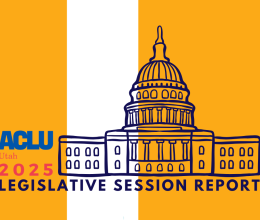
Legislative Report 2025
March 24, 2025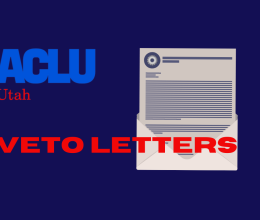
Veto Letter to Governor Cox on HB226
March 20, 2025